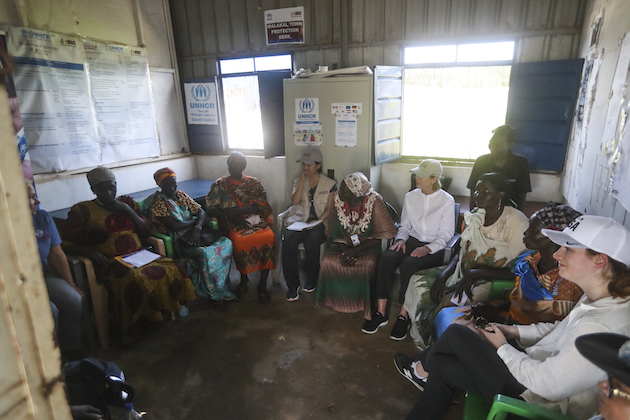On December 6th at the United Nations, UN Ambassador Kelly Craft held a press conference to unveil the UN Security Council’s December agenda. As this month’s president, she said her tenure would focus on a “credible Council.” She was accompanied by her “two co-anchors” Senior Advisor Michael Barkin and Communications Advisor Mark Schlachter.
Confirmed in July of this year, this is the second time Ambassador Craft serves as a representative for the United Nations. In 2007, President George W. Bush appointed her as an alternate delegate to the General Assembly.
In her opening remarks, the Ambassador used her leadership role to advocate for more public-private partnership opportunities, sports diplomacy, like the basketball camp she visited in South Sudan, and the decriminalization of homosexuality, a policy initiative she said the Trump administration strongly supported. She complimented the Council for making headway on passing resolution 2475 that protects persons with disabilities sustained during armed conflict.
In a unique gesture of hospitality, the third generation Kentuckian announced a retreat for Security Council members in her home state on December 13-15th. She said the event would be an informal opportunity to “hold conversations” and “really get to know one another” over Bourbon tastings and a University of Kentucky basketball game. (The Kentucky team practices in a building named after its donor, Joe Craft, her husband.)

In anticipation of the new year, Ambassador Craft explained a need for examining and evaluating the Security Council’s progress in 2019. “I think we have to take an honest look at the last 11 months, and where we are, and where we need to go forward, and to do better on certain topics.” She softly chastised the Council, asking members to speak more often from their hearts than scripts. She also said it suffered from a “credibility gap.”
The Ambassador drew attention to a key example. “There is no issue to me that has proven more damaging to the Council’s credibility than the conflict in Syria.” She outlined actions that would be taken on December 19th, when the Security Council will discuss the issues of humanitarian aid in Syria. She condemned human rights violations of the Syrian people, the “inexcusable” use of chemical weapons, and said that both President Bashar al-Assad and Iran would be held accountable for their involvement.

After outlining the meeting agendas for Iraq, Afghanistan, and Central Africa, the Ambassador answered questions, providing limited insight — aside from deep concern — over the escalating situation with North Korea and “extreme pressure campaign” against Iran. She said the Security Council was focused on North Korea’s ballistic missile launches, adding, “It’s a situation we’ll probably make public at some point.”
When asked if the Security Council or the United States were considering sanctions against Iraqi officials for the government’s repression of protests that has led to thousands being injured and hundreds dying, the Ambassador said she could not get ahead of the United States’ National Security Council. But she reiterated her support and solidarity for young people, and said this week’s meeting with the UN Special Political Mission in Iraq had been constructive.
Ambassador Craft confirmed U.S. support for a peaceful solution that protects both countries, including Palestinian refugees. But she drew a clear line, saying the US would continue to stand with Israel, and the Council’s “relentless” and “one-sided” criticism would not be permitted.
With just minutes remaining at the press conference, Ambassador Craft was asked if the U.S.’s stance on the legality of Israeli settlements presented a credibility issue for the Council. Ambassador Craft said the settlements would be handled on a case-by-case basis. She did not state her opinion on whether Israeli settlements violated international law.












